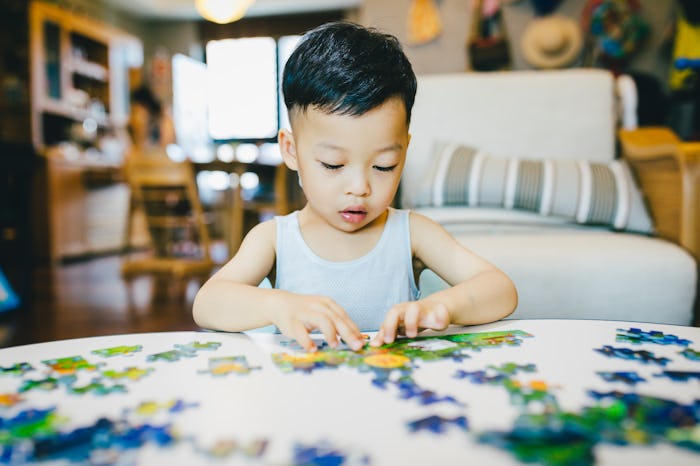Life

Playing With A Puzzle Is Actually One Of The Best Activities For Kids
I could sit for hours putting together a puzzle. Puzzles let me zone out ever so slightly because they provide a distraction from my buzzing brain, but as it turns out, my favorite "mindless" activity is also beneficial for my kids. Why are puzzles so good for kids? Experts agree that parents should encourage this very beneficial activity for a variety of reasons.
"Playing with puzzles can develop both the right and left hemispheres of the brain (creative and feeling, and logical)," child psychologist, author, and parenting coach Maureen Healy tells Romper. "This means it's uniquely suited to help a child feel more confident as well as think the thoughts of self-confidence (e.g. I am good at this, I am improving, Wow, I did it)."
Simple learning puzzles can be used to help younger kids learn their colors, shapes, numbers and letters, while more complex jigsaw puzzles help older kids hone in on problem solving skills. But there are also developmental benefits to putting together a puzzle that extend to the emotional, social, and physical spheres.
"The act of getting immersed into a project helps children build focus and attentional skills," Healy tells Romper. "These are skills that can translate into other parts of his or her life. For example, the child who is learning how to slow down and self-soothe needs to be able to pay attention to what's happening inside of him or her."
Puzzles can also be a low-key yet fun way to boost your child's social skills. If your child is shy, they can engage in puzzle play with other kids to learn to share pieces and work together to figure out where the pieces go. Interacting with peers in this low-pressure situation that doesn't require a ton of talking can be helpful for kids who are hesitant to engage with others.
"Certainly, a child who is working on a puzzle with someone else is learning to take turns and work cooperatively," Healy tells Romper. "These are two very important skills, which help throughout life and build social intelligence — or more commonly termed social skills. The ability to pay attention and focus are also important life skills, which puzzles can certainly help with."
I'm probably not the only parent whose kids would rather play flashy games on an iPad or on a video game console than sit quietly putting together a jigsaw puzzle. Obviously, a puzzle is a puzzle, and some benefits of puzzle play can still shine through if your child puts together a digital puzzle in an app, but the fine motor skill development that occurs when kids put a physical puzzle together doesn't really happen in the same way with digital puzzles.
"Puzzles develop fine motor skills. Smaller, flatter pieces are more difficult and therefore more of a challenge, while larger, bulkier pieces are easier to manipulate," Erynn Weston, a Doctor of Physical Therapy, tells Romper. "Ideally, you want your child to have a 'just right' challenge, not too easy or too hard."
Now that you know why puzzles are so good for kids, the challenge may be figuring out how to get your kid (who — if they are anything like mine — rarely sit still) to actually engage in puzzle play. Healy says that parents can encourage their kids to play with puzzles by keeping the following tips in mind.
"Parents can get down on the floor or sit beside their son or daughter to engage in completing the puzzle together," Healy recommends. "There can also be a very fun process at picking out a puzzle, too. My niece, Rhiannon, loves geography and absolutely adores her puzzle of the United States. She's four years old and has learned all the states by sight as well as name. For whatever reason this puzzle 'lights her up' and she's completely engaged. Find something your son or daughter loves and get a puzzle that fits his or her interests."
Experts:
Maureen Healy, child psychologist, author of "The Emotionally Healthy Child," and parenting coach at Growinghappykids.com
Erynn Weston, Doctor of Physical Therapy, Eternal Anchor
This article was originally published on